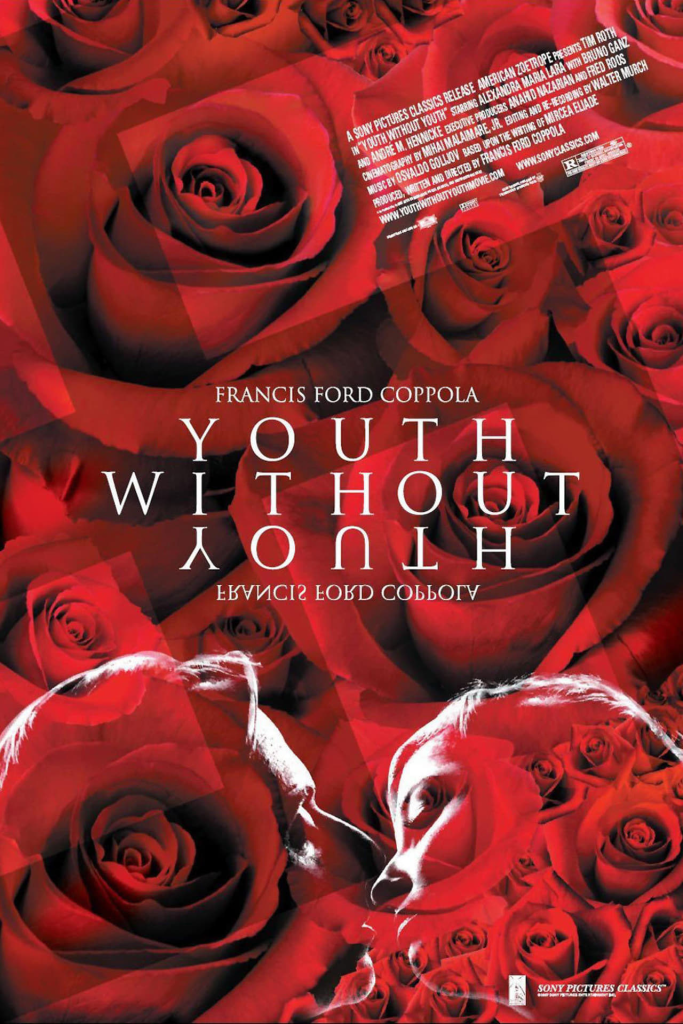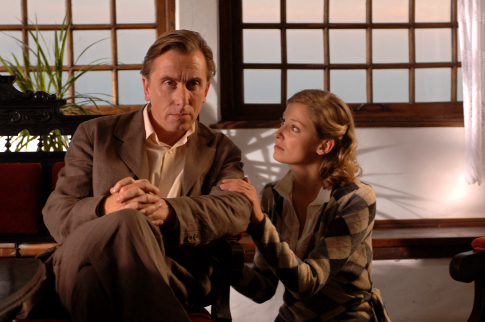In pre-WWII Romania, 70-year-old scholar Dominic Matei (played by Tim Roth) is struck by lightning and burnt to a crisp on Easter Day- a day when, we are told, anyone who dies goes straight to Heaven. Something even more unlikely happens: instead of dying, Dominic is endowed with seemingly supernatural self-healing powers. Charred skin heals, eyesight and voice return, old teeth are replaced by new strong set of teeth. After a bit of this Benjamin Button act, Dominic finds himself in the body he had as a 30-something year old, but with the painful memories that accumulate with the years. What is it like to have Youth Without Youth?

Soon, inexplicably, there is a sexy Nazi spy with swastikas on her garter belt seducing Dominic, because everyone knows the Gestapo’s usual M. O. was to send beautiful women all over the seduce men in the hopes that post-coital contentment might lower resistance to hearing quotes from Mein Kampf.

Francis Ford Coppola, usually so good at finding the core of the texts he’s adapting, is working from a Romanian novel by Mircea Eliade (a religious historian and fantasist whose relationship with the Nazis was ambiguous at best), and Coppola presumably wants to honor the novel’s philosophical intentions (there are questions hinted at here of time, fate, love, religion, reincarnation)- but in Tim Roth’s narratorial voice any profoundities become, by turns, platitudes or incoherencies, like maybe the lightning strike did more damage to our alleged genius protagonist than the plot lets on.
There had been a ten-year break since Coppola’s previous movie, The Rainmaker, a modestly successful courtroom drama based on the John Grisham bestseller- a break in which something must have happened to Coppola. It’s as though he’d been cursed with the opposite fate of his hero: his once assured style has grown shaky, aged not by 10 but by 30 years- while the accumulated directorial experience of his storied cinematic career is gone. There are some oddly amateurish moments here that might have been thought up by a rookie who’s just seen his first David Lynch: “Wow, guys, if we, like, film things upside down, and then tilt the camera, it will be, like, a cool, trippy dream or something!” Coppola tackles dream passages like an alien who has heard second-hand about “dreaming” in an instructional manual called Odd Things Earthlings Do.

The man who once marshalled the large cast of The Godfather movies into coherent performances, (yes, even Sofia), here seems barely in control of Tim Roth, whose weird character is so off-rooted it doesn’t even feel like one character, but four or five different ones Roth is trying out, uncertain of which one to stick to. Dominic provokes so little sympathy one starts rooting for the Nazis to grab him. At least love interest Alexandra Maria Lara has an excuse for the diffuseness of her character: she literally has two roles to play in a bizarre reincarnation plot. What magical things CAN’T lightning do? The rest of the multi-national cast seems lost as if they were all working from poorly translated versions of the script. There is enough intrinsic weirdness in Youth Without Youth’s esoteric plot that I at least wondered where it was all going to land. Ignore the terrible moments, and settle back to enjoy how Coppola occasionally uses light and shadows in ways reminiscent of The Godfather, and indulge him in his rants about the passing of time that he’s certainly earned the right to write.


An excellent review. I haven’t heard of this movie before, but your review has definitely compelled me to check it out. I’m a fan of Francis Ford Coppola. His mobster masterpiece “The Godfather” is my favorite movie of all-time. It was a groundbreaking film that laid the foundation for the gangster movie genre. It’s hard to imagine what Cinema would be without that movie. His latest work doesn’t sound that great based on your review, but I’m still curious to see it for the director alone.
Here’s my thoughts on “The Godfather”:
Yes, definitely not at the level of “The Godfather” but his recent films are worth seeing, The Coppola movie I’m reviewing next, “Tetro”, is much better. This is all building up to the release of his newest, probably last, movie, “Megalopolis”.